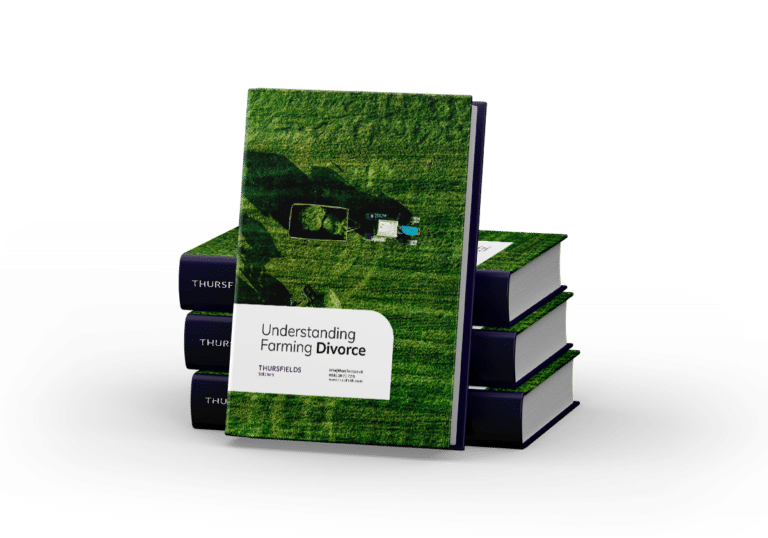How are Assets Divided in a Divorce?
One of the most common questions separating spouses have is “how are assets divided in divorce?” For some, potentially sensitive conversations about finances can lead to significant delays in obtaining a financial remedy order. When there are disagreements over the likes of unmatched contributions and how much each party will need, the potential for conflict may increase.
While seeking an answer to the question “how are assets divided in a divorce” is important, you should also bear in mind that no two relationships are ever the same. As a result, there is no hard and fast rule for division of assets following a separation. Therefore, the best way to secure a positive outcome for you and your family is to take advice from a family law specialist. Thursfields’ solicitors can offer the guidance you need to secure a favourable resolution.
Division of Matrimonial Assets: What is Included?

In order to determine the division of assets in divorce, the courts will refer to UK case law and Section 25 of the Matrimonial Causes Act 1973. This act lays out basic guidelines for features such as property, pensions, savings, and child maintenance. The welfare of children will take precedence throughout proceedings.
How the courts choose to use its powers will largely be influenced by how many children or dependents are affected by the separation. This discretionary aspect is what makes it so difficult to apply a single rationale to divorce cases.
In order to determine the division of assets in divorce, the courts will refer to UK case law and Section 25 of the Matrimonial Causes Act 1973. This act lays out basic guidelines for features such as property, pensions, savings, and child maintenance. The welfare of children will take precedence throughout proceedings.
How the courts choose to use its powers will largely be influenced by how many children or dependents are affected by the separation. This discretionary aspect is what makes it so difficult to apply a single rationale to divorce cases.
How Are Assets Divided in a Divorce in the UK?
Section 25 of the Matrimonial Causes Act 1973 lists which factors the courts will consider when splitting assets in a divorce. Those features are:
- Financial Resources: What total assets, income, properties, etc. do the two spouses have at their disposal right now, and how is this likely to change in the future?
- Financial Needs: What financial responsibilities does each have and what will they need to meet these responsibilities in the future?
- Standard of Living: What standard of living did the family enjoy before the marriage broke down? Can this be maintained?
- Age and Duration: How old were the couple when the marriage began and for how long did it last?
- Disabilities: Has either spouse had any mental or physical disabilities during the mariage?
- Contributions: How did each party contribute to the family? This takes into account both financial support and time spent caring for children and maintaining the family home.
- Benefits: What benefits will either party be deprived of as a result of the breakdown. For instance, will a spouse not get to benefit from a long-held pension?
Again, it’s important to note that these features are a guide rather than a strict procedure. They are there to help the courts decide how best to use their powers of discretion while hearing your case. So, while a 50/50 split might be a broad starting point, it is not fixed.

What Can the Courts Do When Splitting Assets in a Divorce?
When considering the division of assets in divorce, the courts can opt for one of several orders. These include cash payments, the transfer or sale of a shared property, increased maintenance payments, and more. Again, the approach they choose is entirely up to their discretion.
The full scope of courts’ orders include:
– Lump Sum Payment
The courts can choose to order one spouse to make either a single large payment or a number of smaller payments over time. Alternatively, one spouse might receive the family home in exchange for a cash payment from the other. Similarly, one party could be ordered to pay a one-off fee in exchange for reduced future maintenance payments.
– Sale or Transfer of Property
Any property can either be transferred from one spouse to the other, or sold, during a divorce. This is most common with a matrimonial home but could also involve a second home, holiday property, buy to lets etc.
One party can also be made to either hand property to the other, or insist that the house is sold and the funds transferred from one spouse to another.
– Pension Sharing
Division of matrimonial assets can also include pension funds. A court can order one spouse to donate either all or a percentage of their pension in order to fund a new pension for the other person. This approach is called a pension sharing order.
– Maintenance
The courts have minimal input into spousal maintenance, as this is handled by the Child Maintenance Service. However, once maintenance has been established, this can be confirmed in a binding Consent Order.
If you’re interested about how you can protect your assets in divorce, you can find our blog here.

How are Assets Dividied in a Divorce: The Main Factors
Because the courts’ options are largely discretionary, there are a range of factors that can influence their decisions. It’s useful to view these as a broad guide rather than an inflexible list. The main things a court will take into account are:
– Child Welfare
The welfare of dependents is the most important factor from the courts’ point of view. While the division of assets in divorce in the UK looks to balance the needs of both parties, children will always come first. If there are relatively few assets to share, it’s common for the main carer to receive the bulk of assets in order to maintain the childrens’ previous standard of living.
– Available Assets
Where relevant, a thorough valuation of all assets, including businesses, properties, and pensions, will need to be disclosed on Form E. Also important is projected future earnings and any likely changes in circumstance.
– Financial Needs
Splitting assets in a divorce will be affected by the financial needs of both parties. Ideally, both spouses will have enough income and assets in order to maintain a comfortable living. If income and assets are of lesser value, the welfare of children will again take priority.
– Age and Duration of Marriage
For longer marriages, the courts will usually aim for an equal split. For shorter relationships, individual contributions carry more weight. For older couples, factors like pensions may become more important to ensure quality of life in later years.
– Lifestyle
Although it’s often impractical, maintaining the parties’ standard of living is a factor. If there are enough resources available to maintain the same standard of living that all parties enjoyed before, this will usually be the target.
– Incapacity
A GP or consultant may need to confirm that one spouse needs extra funds to cover physical or mental incapacity. Once it’s been established that one party needs additional resources to get by, it could be an important factor in the eventual settlement.
– Contributions
Contributions can entail both financial support and bringing up children. Homemakers and breadwinners are effectively viewed as having played an equal role in the overall upkeep of the family unit, so are treated equally. In general terms, the longer the relationship, the more likely a 50/50 split will be. For shorter relationships, the courts may take into account which partner made the more significant financial contribution.
– Loss of Benefit
If, for example, the divorce has resulted in a loss of pension for one spouse, the courts can order that the other spouse divides theirs as compensation. As discussed, this is known as pension sharing order.
– Extreme or Hostile Behaviour
In extreme cases, violent, abusive, or antisocial behaviour can be taken into account. Although this is mostly taken into account in extreme circumstances, it can have an impact on how the courts choose to approach the division of matrimonial assets.
When all information is available to the courts, the next steps come in the form of three hearings. The first is known as a first appointment, the second is the financial dispute resolution meeting, and the third is the final hearing. The final hearing only takes place if the financial remedy could not be agreed at the previous step.

Thursfields, the Specialists at Division of Matrimonial Assets
The question, ‘how are assets divided in a divorce?’ is a simple one with a complex answer. The courts have broad guidelines to refer to, with the welfare of the whole family unit being central. While a 50/50 split that leaves all parties with adequate resources would be ideal, this is not always practical.
Additional factors can make division of matrimonial assets even more complicated. If the likes of high value assets, family businesses, overseas assets, trusts, investments, nuptial agreements etc. are part of your divorce, you should take legal advice. An experienced law firm will be able to help you tackle associated elements like estate planning, commercial property, employment law, and more.
Thursfields is a full-service law firm that can handle every aspect of asset division. Our legal specialists offer in-house solutions that prioritise results, while also sensitively dealing with family matters. We have an excellent track record in highly complex cases.
For further information about how we can help, Contact us today.
Get In Touch
With Us
Need expert legal advice? Our solicitors are here to help. Get in touch today.


